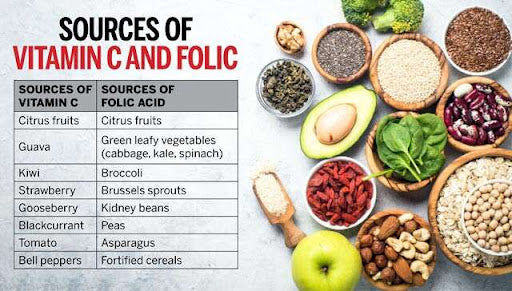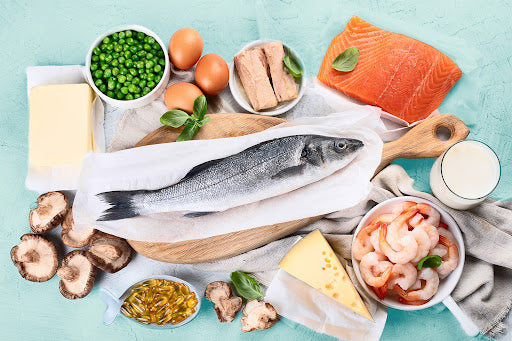Benefits of Following a Mediterranean Diet While Pregnant
Medical disclaimer: The information on this site, and in this specific blog, is not intended or implied to be a substitute for professional medical advice, diagnosis or treatment. Please consult your healthcare provider prior to making dietary changes.
Pregnancy is a time of great change. Your body, your lifestyle, and your diet are all changing at the same time. You may be surprised to learn that you can actually improve the quality of these changes and make this transition easier by following a Mediterranean Diet during pregnancy. There are many foods that are staples of the Mediterranean diet that you can eat to potentially support your baby's brain development and growth, while keeping yourself happy and healthy as well.
In this blog post, we'll discuss the benefits of following a Mediterranean diet while pregnant and the reasons why the Mediterranean Diet has been voted best overall diet for five years in a row by US News and Report.
Are Mediterranean Diets Safe for Pregnant Women?

Evidence shows that a pregnant woman's diet should include plenty of fruits, vegetables, whole grains, low-fat dairy products, and lean protein.
It's always a good idea, and we highly recommend, that pregnant women consult with their doctor to plan their nutritional intake. The information on this site and in this specific blog is not intended or implied to be a substitute for professional medical advice, diagnosis or treatment
Harvard Medical School researchers found that children are more likely to gain weight and have health issues when their mothers eat a diet high in processed foods during pregnancy.
These findings agree with recent studies showing how diets rich in refined carbs can lead us into an unhealthy pattern of eating where people aren’t getting enough vitamins and nutrients.
The results showed a strong correlation between how much inflammation a mother had during pregnancy and the speed at which their children gained weight between 3-10 years old.
In fact, kids that were overweight or obese saw their growth rate drop by up to 15% when they weighed 80 pounds or more than other children did by age 10.
A 2005 research study published in PLOS Medicine showed that FODMAPs, which are carbohydrates that can be difficult for some people with IBS or Crohn’s disease symptoms to consume due to their inflammation-inducing properties, were responsible for increased risk of gestational diabetes and gastrointestinal problems.
This study found that a Mediterranean Diet during pregnancy was associated with a 35% reduction in pregnancy diabetes risk and 2.75 pounds less weight gained while carrying a baby when compared to mothers given national dietary advice otherwise.
This means not only does it matter what kind of food the mother ate while pregnant but also where those calories came from. Especially if she consumed lots of saturated fats & trans fat, as well as cholesterol found naturally within meats & dairy products
What is the Mediterranean Diet and Why Should Pregnant Women Follow it?

The Mediterranean diet is a balanced diet that is based on the traditional foods of people living in Mediterranean countries like Greece, Italy, and Spain. It revolves around vegetables, fruits, whole grains, legumes, brown rice, healthy fats from olive oil, and includes moderate amounts of seafood, poultry, and red meat for protein. The Mediterranean Diet is low in unhealthy foods like processed meats, sweets, and sugary drinks.
Making healthy food choices can be the key to reducing your risk of gastrointestinal problems and pregnancy complications. The Mediterranean diet is rich in healthy foods like fruits, vegetables, whole grains, and healthy fats, which means your body gets plenty of vitamins and nutrients.
Benefits of Following a Mediterranean Diet While Pregnant

A healthy diet during pregnancy will help you have a smooth pregnancy and also support your baby's health.
The Mediterranean diet has been shown to be beneficial for overall health. It can also help reduce the risk of heart disease, type 2 diabetes, obesity, non-alcoholic fatty liver disease, stroke, and other chronic conditions. Recent studies have shown that the Mediterranean diet can also be very beneficial for pregnant women due to its health benefits from the abundance of nutrients and vitamins.
Getting Enough Nutrients and Healthy Fats

Pregnant women can follow a Mediterranean diet to ensure their growing child receives the best possible nutrition.
The Mediterranean diet is rich in fruits, vegetables, whole grains, fish, and healthy fats. All of which provide important nutrients for pregnant women and their babies.
Additionally, pregnant women who follow a Mediterranean diet should obtain plenty of folic acid from fresh green vegetables, which is critical for preventing birth defects.
Pregnant women who want to follow a Mediterranean diet can consult with their doctor or dietitian to create a meal plan that meets their needs.
Folic acid: Folic acid is an essential vitamin that helps to produce new cells in the body during pregnancy.
It has been shown to reduce the risk of neural tube defects such as spina bifida or anencephaly, which can cause paralysis or other disabilities for your baby before birth. Folic acid aids in the production of DNA, which allows your baby’s brain and spine to develop properly.
Folic acid is a water-soluble vitamin and is especially important for pregnant women because it helps to form the neural tube.
It can also help prevent major birth defects in the baby's brain and spine. Some good sources of folic acid include leafy green vegetables, legumes, nuts, and fortified foods.
While it is common to have a sweet tooth when you are pregnant, try to limit the amount of processed sugars you consume. When possible, choose fresh fruit instead of sweets or sugary snacks.
About Vitamin D

Vitamin D is an essential vitamin for your body. It helps to keep your bones healthy and strong, and it can also play a role in preventing some diseases.
That's why it's important for pregnant women to make sure they're getting enough of Vitamin D. The great thing is that the Mediterranean Diet is full of foods that contain vitamin D.
If you're not getting enough vitamin D, then you may have a vitamin D deficiency. A vitamin D deficiency can cause a number of health problems, such as weak bones, soft bones, and Rickets. Rickets is a condition that causes the bones to become soft and weak over time and can also lead to deformities of the bones.
There are a few different ways that you can get vitamin D. The best way to get vitamin D is through sunlight. When the sun's ultraviolet B rays hit your skin, vitamin D is produced. You can also get vitamin D from food and supplements.
Some foods that are high in vitamin D include fatty fish, such as salmon and tuna, eggs, cheese, and mushrooms. You can also take a vitamin D supplement to make sure that you're getting enough of the nutrient.
About Vitamin C

This is a powerful antioxidant that can protect your cells from the effects of free radicals, which may play roles in heart disease and other diseases. Vitamin C is important for pregnant women because it helps make red blood cells, which carry oxygen to all parts of the body.
When you don't get enough of vitamin C, it can lead to a number of health risks, such as:
- Fatigue: Fatigue is also a side effect of vitamin C deficiency.
- Anemia: Vitamin C is necessary for the production of red blood cells, so a lack of this nutrient can lead to anemia.
- Swollen joints: It is important for the maintenance of collagen, which helps keep joints healthy.
You can get vitamin C and iron from many foods or supplements. Some foods that have vitamin C include oranges, grapefruits, strawberries, spinach, and red meat. Red meat is only recommended in small amounts within the Mediterranean diet, but all of the fruits and vegetables mentioned make up a majority of the diet.
What are the Potential Outcomes of an Unhealthy Diet for Pregnant Women?
Junk food can make pregnancy harder than it has to be. It may increase your risk of several pregnancy-related symptoms such as heartburn, and stretch marks.
There are a number of unhealthy foods pregnant women should avoid. These include processed foods, fast food, dairy foods, sugary drinks, and candy. These high FODMAP foods can increase the risk of gestational diabetes, excess weight gain, and other health problems. It can also lead to health problems for the child when it is born as well.
Junk Food to avoid while you're pregnant
Junk food: while it is okay to enjoy in moderation, you should avoid eating too much junk food during pregnancy and embrace healthy eating habits such as the Mediterranean Diet.
This includes avoiding foods high in sugar, salt, saturated fats, and artificial additives. Junk food can cause problems like obesity, gestational diabetes, and preterm labor. It can also limit the nutrients your baby gets from you while they’re growing in your womb, which can lead to health problems in the child’s future.
If you have healthy food options at home, you’ll be less likely to reach for unhealthy snacks. Keep foods on hand like nuts and dried fruit for snacking.
Below are some of the foods to avoid during pregnancy:
Raw or undercooked meat, fish, and eggs may contain harmful bacteria like salmonella that can make you sick.
Caffeine in high doses can be dangerous for the developing fetus, especially during the first trimester.
Certain kinds of fish, like tilefish, shark, swordfish, and king mackerel are too high in mercury to eat while pregnant.
Alcoholic drinks can cause problems for the fetus in all stages of development, including brain damage and fetal alcohol syndrome.
Unpasteurized dairy products can contain harmful bacteria that can cause listeriosis, a serious infection.
Unwashed raw fruits and vegetables may contain harmful bacteria that can cause food poisoning.
Highly processed junk foods that contain chemical additives, refined sugars, and/or high sodium.
Tips on How to Satisfy Food Cravings During Pregnancy

If you have cravings for unhealthy food then it’s important to find substitutes that are still tasty as well as give you the essential nutrients you need. Here are some healthy substitutes for foods you may crave to ensure you have a healthy pregnancy diet.
Good foods for pregnancy: these include whole grains, whole-wheat pasta, vegetables, fruit, low-fat dairy foods, lean protein, and healthy fats.
All of the foods listed are packed with nutrients like folic acid, calcium, potassium, vitamin C, vitamin D, and other vitamins and nutrients that your body needs to keep your baby healthy.
Replacements for Junk Foods You Crave
Cravings are intense for pregnant women and they never seem to end. Here are some healthy substitutes for unhealthy foods that you might crave.
If you want something salty, then you can grab some healthy nuts instead of potato chips. If you need healthy snacks with a crunch, then go for air-popped popcorn over cookies or pretzels.
If you’re craving something sweet and tangy, then try fresh fruit instead of candy or cake.
Another healthy substitution solution is swapping out soda for juice. Soda is high in sugar and calories, and it can also contain harmful chemicals like Aspartame.
Orange juice and beet juice are healthy options that provide vitamins and minerals your body needs while pregnant. They’re also low in calories and sugar, so they won’t cause unwanted weight gain.
One healthy snack option is hard boiled eggs. Eggs are a good source of protein, and vitamins and minerals like B12, riboflavin, and selenium. They also contain healthy fats that are beneficial for both you and your baby.
Instead of eating fried foods, bake all of your foods to ensure you aren’t taking in unhealthy oils and simple carbs.
Healthy Foods For Pregnant Women Can Make All the Difference

Eating nutritious foods during pregnancy is important for both the mother and the baby. By following a healthy diet, you can ensure that you and your baby are getting the necessary vitamins and minerals to ensure good health during and after the pregnancy.
If you're looking for healthy eating habits during your pregnancy, then the Mediterranean diet is a great place to start. If you're interested in following a Mediterranean diet while pregnant then it would be smart to talk to a dietitian or nutritionist to ensure you have a solid plan in place.
They can help recommend specific foods or supplements that will benefit both you and your growing baby. If the Mediterranean diet seems like it will be too big of a hassle while you are pregnant, then you can always order fully prepared Mediterranean diet meals from a meal service such as ModifyHealth. To learn more about ModifyHealth’s Mediterranean Diet meal plan, then click the link: View Mediterranean Diet Menu

 >
>